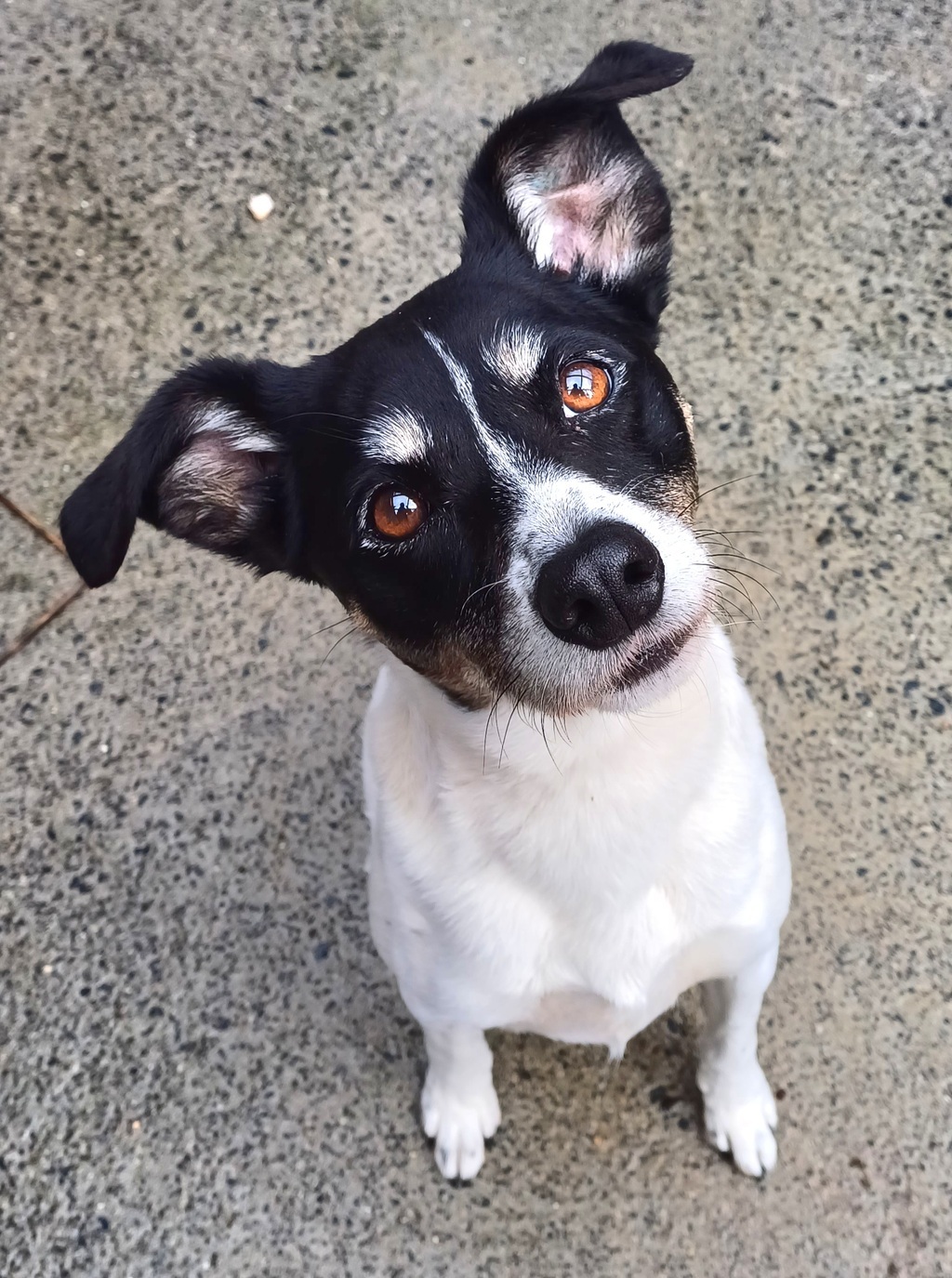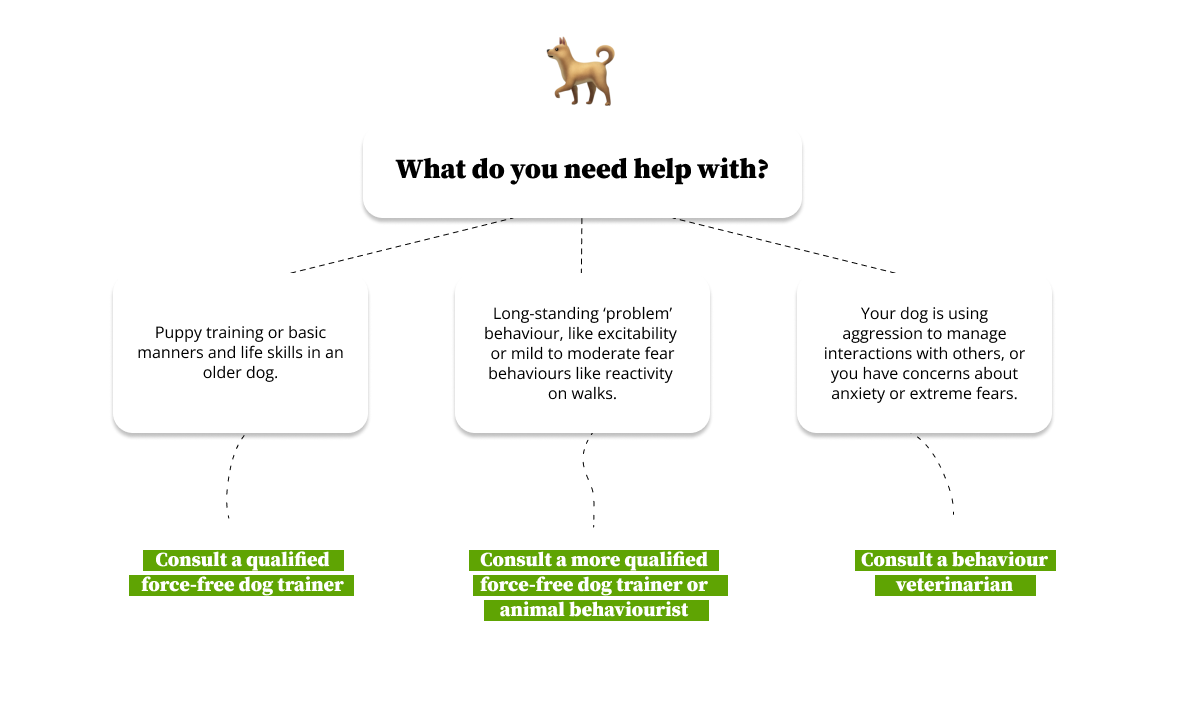 Keeping doggy playdates safe & happy
Read more
Keeping doggy playdates safe & happy
Read more
Last updated: 20 Jun, 2024
Published on: 18 Dec, 2023
Finding the Right Dog Trainer: A Positive Training Guide for Pet Parents

Choosing the right dog trainer for your furry family member is like embarking on a journey through a bustling marketplace filled with options that are not created equal.
After all, our dogs are family members and deserve the best possible care and training.
The key is to navigate the dog training industry wisely, as it lacks regulation. There are plenty of highly qualified dog trainers out there, but there are also some who use old, harmful and dangerous training methods.
In the past decade, we’ve come a long way in understanding dog behaviour and how they learn. Thanks to a huge amount of scientific research, we now know what works to create the healthiest and best relationships between us and our canine friends.
So, how do you find the right dog trainer to give your best friend the best chance at being their best self? We’ve summarised a list of do’s and don’ts below, but keep reading for more in-depth information for each.

Do:
-
Start your search with reputable associations like The Pet Professional Guild Australia, The Fear Free Pets Initiative, The Association of Pet Dog Trainers Australia and The Delta Institute.
-
Verify qualifications and seek dog trainers with at least a Certificate IV level qualification, backed by evidence of ongoing and quality education in positive reinforcement training.
-
Choose carefully for complex problems; seek dog trainers collaborating with Behaviour Veterinarians and other pet health professionals.
-
Learn more about animal behaviour and watch for signs of happy, relaxed engagement during training.
Don’t:
-
Don't accept experience over qualifications; a lack of visible qualifications is a red flag.
-
Don't be fooled by an extensive list of short courses and conferences; genuine education matters.
-
Don't let marketing materials sway you; a fancy website doesn’t guarantee a dog trainer’s qualifications.
-
Don't believe in quick fixes or guarantees; solving complex issues takes time, and understanding your dog’s history is crucial.
-
Don't ignore red flags; terms like alpha, dominance, or the use of certain tools may indicate outdated training methods.

Now that you know what to look for, use these three basic categories to help you identify the type of help you need.
-
Puppy Training or Basic Manners: Consult a qualified trainer using positive reinforcement for a happy life together.
-
Long-standing ‘Problem’ Behaviour: Seek an experienced, qualified trainer or an Animal Behaviourist collaborating with health professionals.
-
Aggression, Anxiety, or Extreme Fears: For safety or welfare concerns, consult a Behaviour Vet. If there's a wait, ask for recommendations for immediate help from a non-vet behaviourist or qualified trainer.
Remember, your dog is communicating challenges, and finding a supportive, qualified dog trainer gives your dog the best chance at being their best self.
Keep reading to learn more about how to find a qualified force-free dog trainer and how to identify what type of help you need.


Ragnar - Sweet Pea Animal Hospital
Research has shown the advantages of using positive reinforcement and fear-free methods in dog training. Just like with our human family, providing supportive, kind guidance and clearly communicating in a respectful way builds trust, strengthens the bond between you and your dog, and encourages good behaviour without causing pain or distress to our furry pals. Best of all, using rewards to train with your dog is fun!
Do’s
Start your search with the following associations:
The Pet Professional Guild Australia
The Association of Pet Dog Trainers Australia
Australia New Zealand College of Veterinary Scientists Behaviour Chapter
Verify qualifications, education, and training.
Look for a dog trainer with at least a Certificate IV level qualification (qualifications can go all the way up to postgraduate degrees!), which is supported by evidence of ongoing education in positive reinforcement training. Qualified dog trainers who value ongoing education are usually the most knowledgeable and skilled.
Choose carefully for more complex problems.
Be especially careful if you need help with something more than just building life skills in your canine family member, such as fear or aggressive behaviour. Look for dog trainers who collaborate with other pet professionals, including Behaviour Veterinarians, and have an in-depth education in the area you need help in.
Learn more about dog behaviour.
Learn about how dogs communicate (and how you can understand them) by exploring resources on dog body language and behaviour. You can tell a lot about a trainer’s skill and approach by watching the dogs they are trying for signs of happy, relaxed engagement - look for the kind of relationship you want with your dog!
Learn more about ‘Who’s Who’ in the world of dog training.


Paige, RSPCA Burwood East Victoria
Don’t’s
“Old school’ methods that use positive punishment and aversives to suppress behaviours can harm our relationships with our dogs. Research also shows that using aversives for training negatively impacts dog welfare, increasing the likelihood of stress-related and pessimistic responses (a measure of animal welfare), fearful or aggressive responses and other problematic behaviours from our dog friends - the exact opposite of what we are trying to achieve through training!
Don’t accept experience over recognised qualifications.
You wouldn’t trust a doctor who claims “20 years working with people” but has no qualifications. If the dog trainer's qualifications aren’t on their website, it’s a red flag.
Don’t be fooled by a long list of short courses and conferences.
A dog trainer may list many conferences and workshops, but that doesn’t mean they have a quality education. Often, recognition is given just for attending a conference or seminar. Dog trainers embracing continuing education in addition to the core qualification is a great thing, but they shouldn’t replace a qualification
Don’t be swayed by marketing materials.
Don’t let a dog trainer’s website or other marketing material influence your decision. A fancy website doesn’t guarantee a dog trainer’s qualifications.
Tip: Put your laptop on mute and look at all the dog photos and videos the trainer has online - do the dogs look happy and engaged with the people handling them?
Don’t believe claims of fixing your dog’s complex problems in one session or guarantees about behaviour change.
It simply takes more time to solve the issue in a humane and effective way, and just like us, dogs are individuals with their own personalities and needs.
Be cautious of dog trainers who offer solutions before knowing your dog’s history.
The behaviour you see is the result of many factors - genetics, learning, health, personality, and how you live with and manage your dog. All dog trainers should be curious about both you and your dog so that they can develop a full understanding of what everybody needs.
Don’t ignore red flags.
Words like alpha, dominance, obedience, the use of choke chains or electric collars, spray bottles, or not using food rewards in class are common red flags for a dog trainer who is underqualified or does not use modern methods. The biggest red flag of all is if you feel uncomfortable.


Storm, Peggy's Promise
What type of help do you need?
Now you know what you do and don’t want to do when looking for a dog trainer, you need to work out what type of help you and your furry friend need!
The ‘big buckets’ of behaviour fall into three basic categories:
1. Puppy training or basic manners and life skills in an older dog.
Consult a qualified dog trainer who uses kind, welfare-friendly training methods through positive reinforcement to teach you and your dog the skills required to live happily together.
2. Long-standing ‘problem’ behaviour, like excitability or mild to moderate fear behaviours in specific situations, or something a bit more complex, like reactivity on walks, that you aren’t sure how much of a problem it is
It’s best to initially seek the help of a more experienced qualified dog trainer or an Animal Behaviourist who works with other health professionals in these cases, just in case there is more going on than meets the eye. Together, you can then work out if you need more help from a Behaviour Vet, if you can tackle the problem together, or if a dog trainer in your local area (who may be more affordable and more accessible) would be a better option for you.
3. Your dog is using aggression to manage interactions with others, or you have concerns about anxiety or extreme fears.
In any case, where the safety or welfare of yourself, your dog, or another member of the household or community is at risk, it’s a good idea to seek the input of a Behaviour Vet. More often than not, when your dog is displaying extreme behaviours, they are experiencing significant challenges; your dog is trying to communicate with you that they are struggling, in the only way they know how to.
Behaviour Vets can sometimes have long waiting lists, so if this is the case in your area, ask which non-vet behaviourist or qualified dog trainer they recommend for immediate help. This way, all of the professionals on your team already work together and you have the best chance possible of successful management and treatment of your dog’s problems.

Banner image: Velvet, Geelong Animal Welfare Society
How PetRescue Can Help
PetRescue’s free online help desk can connect you with nearby qualified trainers or vet behaviour professionals to support you and your pet - whether they’re a cat, dog, bunny, guinea pig, horse or goat!
We’re currently in the process of expanding the national trainer database to ensure our team can provide the best support and most relevant referrals to those in need.
If you and your pet need assistance, your can get in touch with us by emailing info@petrescue.org.au. Please provide as much information as possible, including your location, your and/or your pets experience and a phone number so that we can provide the most appropriate support as quickly as possible.














































